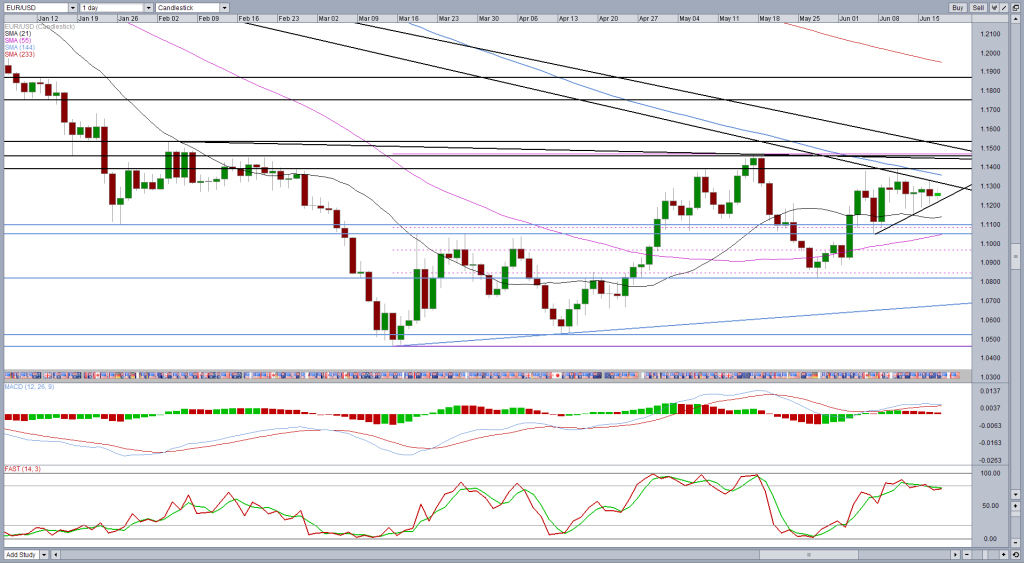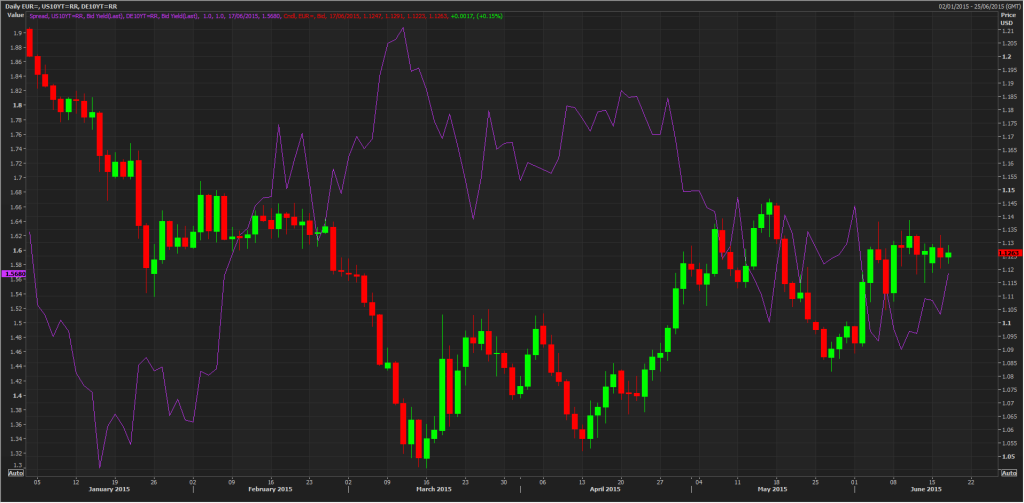Greece has been in negotiations with the institutions – European Union, European Central Bank and International Monetary Fund – for four months trying to come to an agreement on a cash-for-reforms deal that will unlock €7.2 billion in bailout funds. This was agreed back in February but as of yet, Greece has yet to receive a penny as the two sides have been unable to come to an agreement on reforms deemed acceptable and necessary to hit budget surplus targets.
There remains a few sticking points between Greece and its creditors that is preventing a deal being done and neither side is showing any willingness to compromise. Negotiations have been taking place on a daily basis for weeks and progress has been non-existent with both sides resorting to lambasting the other in the media in order to try and pressure them into conceding. As it stands, neither has even flinched.
Until now Greece has managed to fund itself and honour its debt repayments, sometimes using extreme measures, but it finally appears to have run out of options. On 5 June, Greece informed the IMF that it intended to bundle together four repayments due in June until the end of the month, an option that was introduced by the IMF in 1970’s and only used once, by Zambia in the mid 80’s.
It is widely believed that Greece does not have the cash to make that repayment which means that if it doesn’t receive the bailout funds by the end of June, it will default on the repayment to the IMF. For Greece to receive the money, it has been suggested that a deal would need to be agreed at the eurogroup meeting on Thursday (18 June) in order to allow time for the deal to pass through the respective parliaments, but this looks extremely unlikely. If a deal can be agreed in the next two weeks, I’m sure both sides will find a way around this and allow Greece to avoid default.
What stands between Greece and its creditors coming to a deal?
The key issues standing between a deal being done appear to focus around pensions and VAT. Pensions in particular are believed to be a deal breaker for Greece as the Syriza party vowed to block cuts to pensions when elected in January.
Greece is also insisting that a deal contain some form of debt forgiveness as its current debt levels are unsustainable. While few people disagree with this, it seems very unlikely that the EU will agree to any debt forgiveness while Greece is involved in a bailout program, especially when it is rejecting the reforms they are insisting on.
Alexis Tsipras has also claimed that there are differences between what the IMF wants and what the EU is demanding. Tsipras believes the IMF is open to debt relief but refuses to back down on austerity measures that he is strictly opposed to, while the EU will not consider any form of relief.
All things considered, Greece and the institutions appear very close to a deal but with neither side willing to budge on these few key issues, they are equally miles apart. I don’t think many people are actually confident any more that the two sides can find a suitable compromise.
What happens now?
That very much depends on a few things. The first is whether Greece has enough cash to fund the payment of pensions and public sector wages at the end of the month, estimated at around €1.6 billion, as well as a €1.5 billion repayment due to the IMF. It is believed that the country doesn’t have enough to fund both and Tsipras has made it clear that pensions and wages come first.
This leaves two likely outcomes. Either we see some significant compromises and an agreement is reached or Tsipras stands by his election promises of no more austerity, risks default and accepts the consequences. The latter is very undesirable and what follows is highly uncertain which is why investor and business sentiment at the moment is so fragile.
The first thing that would likely follow a default to the IMF is a significant increase in withdrawals in Greek banks as people would see their cash as being at risk. Especially as these banks are currently being propped up by the ECB through its ELA program, with support to Greek banks currently standing at €83.7 billion.
For Greece to be cut off from ELA, the country either needs to be declared bankrupt or its banks insolvent. The ECB insists the banks are not currently insolvent, despite them being on life support from the Greek central bank. Even if Greece fails to repay the IMF on 30 June, it may still not be declared as in default by the IMF, which would allow its banks to continue the access the ELA a little longer. Once it defaulted on its debt to private creditors or the ECB, it would almost certainly be game over.
One option for the ECB would be to apply a haircut on the collateral it accepts from Greek banks in order to apply pressure to the Syriza government to soften its stance and accept a deal in order to avoid a collapse of its banks. The ECB has cut banks off from ELA in the past which has forced governments to accept deals they otherwise were opposed to.
Given the increased pace of withdrawals, especially if combined with haircuts from the ECB, Greece could be forced to put in place capital controls in order to limit the amount of cash being taken out of the banks and prevent a total collapse. With the country running out of money, this could be accompanied by Greece introducing a parallel currency, either literally with the reintroduction of the Drachma or in the form of IOU’s, in order to pay pensions and wages.
These are all drastic measures that could ultimately result in a “Grexit” and a much deeper financial crisis in Greece. The eurozone would likely suffer as well, although the contagion would not be anywhere near as bad as it would in 2010 as a result of the efforts made by other countries and the banks to deleverage, reform and reduce exposure to Greece.
The ECB would also be able to offer support to any banks impacted by a “Grexit”, while its OMT program – which was deemed legal by the European Court of Justice this week – would be able to buy bonds of countries who’s yields spiral out of control, if need be.
There would obviously be an economic impact of a Grexit, not to mention the fact that the euro’s irreversibility would now be called into question, but these problems could all be managed.
What’s happening in the markets?
Equity and bond markets in Europe are coming under significant pressure, particularly in Greece where the main stock index is down more than 17% in the last four trading sessions and two-year yields have soared to above 30%.
The euro has shown a strong resilience to all of this Greek uncertainty which has come as a surprise to some people. Against the dollar, the euro has actually risen over the last couple of months while in recent days it has only consolidated. In fact, we are yet to see any real weakness in the euro in response to Greece.
That’s because currencies don’t tend to respond to uncertainty unless that starts to have a direct impact on interest rates – the major driver of FX markets. For example, if Greece were to leave the eurozone, this would likely impact the level of support that the ECB would offer in order prevent another crisis. This would impact rates and therefore the euro. However, speculation and uncertainty alone does not directly influence rates.
This can be displayed through a comparison of EURUSD against the US Treasury-Bund spread, which are impacted by interest rate expectations.
Source – Thomson Reuters Eikon
As you can see from the above chart, EURUSD has a strong negative correlation with spread between the US 10-year Treasury and the German Bund. As Bund yields rise faster than Treasury yields, the euro becomes more attractive than the dollar, which explains the currency moves in EURUSD.
I expect this correlation to continue to be the driving force behind the moves in EURUSD, until the point that Greece borders on or actually defaults, at which point we could see a re-evaluation of interest rate expectations for the eurozone, possibly prompted by further support being required by the ECB.
With that in mind, if a deal on Greece is achieved in the coming weeks, I would not expect to see a huge amount of upside. There may be some reaction but not as much as I would expect to the downside if Greece defaulted on its debt and a “Grexit” became reality. The danger is if a deal or default comes on the weekend while the markets are closed as we could see some large gaps in the markets when they reopen.
Content is for general information purposes only. It is not investment advice or a solution to buy or sell securities. Opinions are the authors; not necessarily that of OANDA Business Information & Services, Inc. or any of its affiliates, subsidiaries, officers or directors. If you would like to reproduce or redistribute any of the content found on MarketPulse, an award winning forex, commodities and global indices analysis and news site service produced by OANDA Business Information & Services, Inc., please access the RSS feed or contact us at info@marketpulse.com. Visit https://www.marketpulse.com/ to find out more about the beat of the global markets. © 2023 OANDA Business Information & Services Inc.




